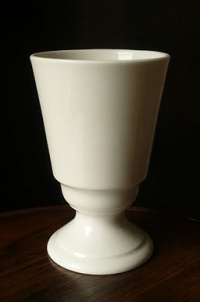Earthenware mug
| Interwiki |
|---|
|
български • Deutsch • English • Español • Esperanto • Français • Italiano • Lietuvių • Lojban • Nederlands • Polska • Português • Русский • Suomi • Svenska • Türkçe • 中文 |
| |||||||||||||||||||||||||||
Note: The earthenware mug is made using the build menu rather than using the kiln's use button.
Real World Context
Earthenware is a kind of ceramic stoneware that is "non-vitreous", meaning that it hasn't been turned into a kind of glass. Basic earthenware, often called terracotta, absorbs liquids such as water. However, earthenware can be made impervious to liquids by coating it with a ceramic glaze.
For a mug, it is more likely that it be made out of stoneware, a rather broad term for pottery or other ceramics fired at a relatively high temperature to make it either vitreous or semi-vitreous so as to make it nonporous (i.e. does not soak up liquids). Whereas earthenware items can be made out of just about any type of clay and are fired between 600°C and 1,100 °C (2,010 °F), stonewares require between about 1,100 °C (2,010 °F) to 1,300 °C (2,370 °F) and certain types of clay.
Stoneware, which, though dense, impermeable and hard enough to resist scratching by a steel point, differs from porcelain because it is more opaque, and normally only partially vitrified. It may be vitreous or semi-vitreous. It is usually coloured grey or brownish because of impurities in the clay used for its manufacture, and is normally glazed.
